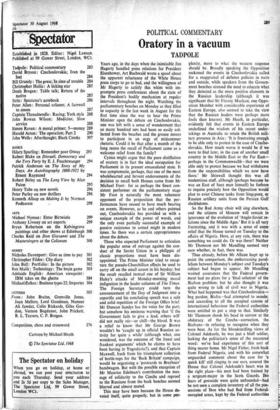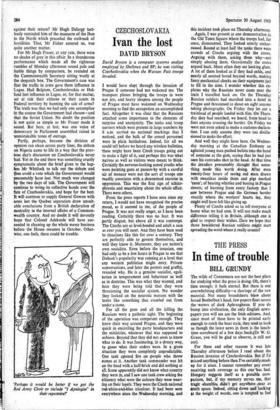Oratory in a vacuum
POLITICAL COMMENTARY TADPOLE
Years ago, in the days when the inimitable Jim Hagerty handled press relations for President Eisenhower, Art Buchwald wrote a spoof about the apparent reluctance of the White House press corps to go to bed, and the willingness of
Mr Hagerty to satisfy this whim with im- promptu press conferences about the state of the President's bodily mechanism at regular intervals throughout the night. Watching the parliamentary benches on Monday as they filled to capacity in the last week in August for the first time since the war to hear the Prime Minister open the debate on Czechoslovakia, one was left with a sense of wonderment that so many hundred MPS had been so easily col- lected from the beaches and the grouse moors to participate in an orgy of midsummer rhetoric. Could it be that after a month of the long recess the recall of Parliament came as a welcome relief from the family?
Cynics might argue that the pure distillation of oratory is in fact the ideal occupation for Parliament in its present emasculated state. It was symptomatic, perhaps, that one of the most wholehearted and fervent endorsements of the decision to recall both Houses came from Mr Michael Foot: for as perhaps the finest con- sistent performer on the parliamentary stage Mr Foot is naturally the most vehement opponent of the proposition that the per- formances have ceased to have much bearing on events. However, as he and others pointed out, Czechoslovakia has provided us with a unique example of the power of words, and the only even partially successful example of passive resistance to armed might in modern times. So there was a certain appropriateness about the debate.
Those who expected Parliament to articulate the popular sense of outrage against the con- duct of the Soviet Union in a philippic of classic proportions must have been dis- appointed. The Prime Minister tried to recap- ture the pseudo-Churchillian effects he used to carry off on the small screen in his heyday; but the result recalled instead one of Sir William Haley's attacks of Monday-morning moral indigestion in the leader columns of The Times. The Foreign Secretary could turn the announcement of the Day of Judgment into a soporific and his concluding speech was a safe and solid repetition of the Foreign Office brief. Mr Duncan Sandys has the voice for the part; but somehow his ominous warning that 'if the Government fails to give a lead, others will' did not really stir—or chill—the blood. It was a relief to know that Mr George Brown wouldn't be 'caught up in official Russian ac- tivity for quite a while' (although what, one wondered, was the outcome of 'the freest and frankest arguments' which he claims to have been having in Yugoslavia?), and that Captain Maxwell, fresh from his triumphant collection of bottle-tops for the 'Back Britain' campaign, would be organising a 'postcards to Brezhnev' bandwagon. But with the possible exception of Mr Maurice Edelman's contribution the mes- sage of solidarity to the Czechs and reproof to the Russians from the back benches seemed blurred and almost muted.
This may have been because the House de- voted itself, quite properly, but in some per- plexity, more to what the western response should be. Broadly speaking the Opposition reckoned the events in Czechoslovakia called for a reappraisal of defence policies in NATO and outside, while speakers from the Govern- ment benches stressed the need to educate what they detected as the more positive elements in the Russian leadership (although it was significant that Sir Fitzroy Maclean, one Oppo- sition Member with considerable experience of Eastern Europe, also seemed to take the view that the Russian leaders were perhaps more fools than knaves). Mr Heath, in particular, evidently felt that events in Eastern Europe underlined the wisdom of his recent under- takings in Australia to retain the British mili- tary presence in Asia : 'It is frustrating enough to be able only to protest in the case of Czecho- slovakia. How much worse it would be if we were to find later, in the case of another small country in the Middle East or the Far East— perhaps in the Commonwealth—that we were able only to protest because we had withdrawn from the responsibilities which we now have there.' Mr Shinwell thought this was all tendentious stuff, although (perhaps because he was an East of Suez man himself) he forbore to inquire precisely how the Opposition would plan to evict Chinese tanks from Singapore, or Russian artillery units from the Persian Gulf sheikhdoms.
So the Red Army choir will sing elsewhere, and the citizens of Moscow will remain in ignorance of the evolution of 'Anglo-Soviet re- lations since the Middle Ages.' But it is all very frustrating, and it was with a sense of some relief that the House turned on Tuesday to the affairs of Nigeria. Here, at any rate, there was something we could do. Or was there? Neither Mr Thomson nor Mr Maudling seemed very sure whether, in fact, there was.
Thus already, before Mr Allaun leapt up to point the comparison, the embarrassing paral- lelism between Monday's subject and Tuesday's subject had begun to appear. Mr Maudling wanted assurances that the Federal govern- ment had no plans for a 'final solution' of the Biafran problem; but he also thought it was quite wrong to talk of civil war in Nigeria. What had happened was that Czechoslovakia— beg pardon, Biafra—had attempted to secede; and according to all the accepted canons of international behaviour the Federal authorities were entitled to put a stop to that. Similarly Mr Thomson shook his head in sorrow at the obduracy of the Czechs—correction, the Biafrans—in refusing to recognise when they were beat. As for the bloodcurdling views of Colonel Adekunle, he was just a bluff soldier, lacking the politician's sense of the measured word : we've had experience of this sort of thing nearer home. Mr Nigel Fisher, fresh back from Federal Nigeria, and with his somewhat unguarded comment about the case for 'a quick kill' still ringing in our ears, assured the House that Colonel Adekunle's heart was in the right place—his men had been trained by a sergeant-major in the Scots Guards. Ibo fears of genocide were quite unfounded—had he not seen a complete inventory of all the pos- sessions of Ibos who had fled from Federal- occupied areas, kept by the Federal authorities against their return? Mr Hugh Delargy tact- lessly reminded him of the massacre of the Ibos in the North which preceded the outbreak of hostilities. That, Mr Fisher assured us, was quite another matter.
For Mr Hugh Fraser, at any rate, there were no shades of grey in this affair. In a thunderous performance which made all the righteous rumbles of Monday afternoon sound pale and feeble things by comparison, he rounded on the Commonwealth Secretary sitting wanly at the despatch box. The Government's case was that the traffic in arms gave them influence in Lagos. Had Belgium, Czechoslovakia or Hol- land lost influence in Lagos, or, for that matter, set at risk their citizens or their assets in Federal territory by banning the sale of arms? The truth was that we had only one accomplice in the course the Government had chosen—and that the Soviet Union. No doubt the position is not quite as simple as Mr Fraser made it -sound. But here, at last, was one voice of democracy in Parliament assembled raised in unmistakable tones of outrage.
Partly, perhaps, because the division of opinion ran clean across party lines, the debate on Nigeria came to life in a way that the prev- ious day's discussion on Czechoslovakia never had. Yet in the end there was something cruelly symptomatic about the brief given to the hap- less Mr Whitlock to talk out the debate and thus avoid a vote which the Government would presumably have lost. Not much was changed by the two days of talk. The Government will continue to wring its collective hands over the fate of Czechoslovakia, and hope for the best. It will continue to supply General Gowon with arms lest the Quebec separatists draw unsuit- able conclusions from a British declaration of neutrality in the internal affairs of a Common- wealth country. And no doubt it will devoutly hope that Colonel Adekunle will have suc- ceeded in cleaning up the whole messy business before the House resumes in October. Other- wise, one feels, there could be trouble.
`Perhaps it would be better if we got the Red Army Choir -to include "1 Apologise" in their repertoire?



































 Previous page
Previous page